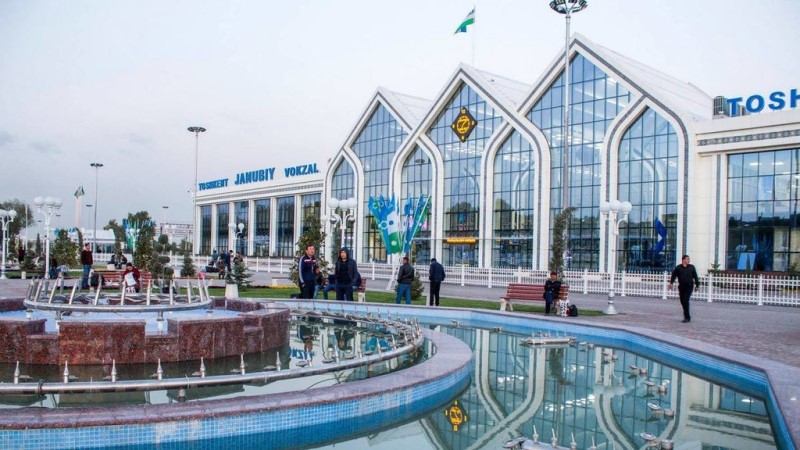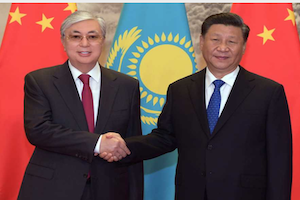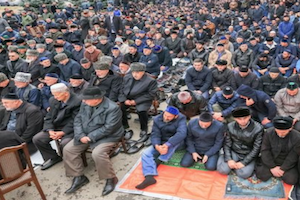The Prospect of Social Innovations in Uzbekistan
By Bakhrom Radjabov
April 29, 2021, the CACI Analyst
For several years now, Uzbekistan’s leadership has been calling for intensive changes and innovations. This was evident in a historic four-hour long address made by the President of Uzbekistan to the Parliament of Uzbekistan. Furthermore, this ambition has been outlined as a government priority when Uzbekistan announced the theme of the year 2018: “Year of Proactive Entrepreneurship, Innovative Ideas and Technologies.” Now, three years after the President’s address, social innovations do not appear to have mushroomed. Why is this the case?

Kazakhstan's President Visits China Amid Troubles at Home
By Natalia Konarzewska
November 12, 2019, the CACI Analyst
On September 11-12, Kazakhstan’s new President Kassym-Jomart Tokayev paid his first official visit to China, aiming to upgrade bilateral ties and generate more Chinese investment in the country. Yet the official rosy picture of flourishing bilateral relations is clouded by the plight of ethnic Kazakhs inhabiting China’s Xinjiang region and the social and environmental concerns surrounding Chinese investments in Kazakhstan. For the past several years, China’s economic clout in the country has been growing but social attitudes towards China have simultaneously deteriorated rapidly, resulting in a rise of anti-Chinese sentiment and protests – the latest taking place in Kazakhstan’s major cities in early September. Moreover, Kazakhstan is undergoing a political transition process which makes the country even more vulnerable to the strong influence of its eastern neighbor.

Emerging North Caucasus Civil Society Presents New Challenges for Authorities
By Neil Hauer
November 8, 2019, the CACI Analyst
The summer of 2019 saw a crackdown on civil society across the North Caucasus. Ingushetia experienced the most severe repressions, with more than 30 individuals still detained, but Dagestan and Kabardino-Balkaria experienced arrests as well. The proximate causes of the crackdown varied among the three republics, but all reflected the fact that a region-wide civil society has flourished since the near-end of the former Islamist insurgency. Authorities are evidently unprepared to deal with this new challenge, and forceful measures against their new, nonviolent opponents have proven ineffective at best.

Kyrgyzstan's constitutional chamber dismisses judge
By Arslan Sabyrbekov (08/07/2015 issue of the CACI Analyst)
Kyrgyzstan’s judicial system has always depended on the executive and legislative branches of power that still tightly control the appointment and dismissal of judges. To ensure the judiciary’s independence in the aftermath of the April 2010 Revolution, two bodies were created; the Council on the Selection of Judges and the Judicial Council, a professional body of judges. However, because both these bodies are closely linked to the parliament and the President, they are hardly independent. This observation is supported by the fact that a number of judges have been ousted from their position for voicing legal opinions at odds with the views of the country’s political leadership.
This time, a senior judge in the Constitutional Chamber of the Supreme Court, Klara Sooronkulova, was dismissed for her position on the controversial legislation on biometric data collection. Last year, the Kyrgyz parliament passed a law for a nationwide biometric data registration program. The program was initially termed “voluntary,” but the submission of fingerprints was later linked to the upcoming parliamentary elections, with the authorities making registration “obligatory” in order to cast the ballot. Civil society activists have issued a unanimous statement that introducing biometric registration as a condition for participating in the elections is a gross violation of citizens’ fundamental constitutional rights and have filed a case to the Constitutional Chamber of the Supreme Court. Sooronkulova was appointed the leading judge to examine the case and sought international advice on the matter. But before she could announce her ruling on the case, Svetlana Boljurova, a lawyer from the parliament’s legal and judicial affairs committee, filed allegations against her. She claimed that in breach of procedure, judge Sooronkulova revealed her views that the biometric data collection was an unconstitutional act, ahead of announcing them publicly and demanded that she be removed from the case.
In the Constitutional Chamber of the Supreme Court, the judges were split 50 to 50. The Chamber’s chairperson had the decisive vote and removed Sooronkulova from the case. At Boljurova’s further demand, the Judicial Council reviewed an allegation that Sooronkulova had shown “insubordination” by criticizing her colleagues for “following the direct order of the president’s and that of the parliament’s Office.” On these charges, the Judicial Council ordered Sooronkulova to step down before the expiration of her term and submitted all the documents to the parliament to pass a final decision.
Kyrgyzstan’s parliament voted three times before it managed to reach 80 votes out of the 120 sitting MPs. According to Sooronkulova, “the situation is completely chaotic. It is clear that in between the votes, the President’s Office was working with MPs using different methods.” Sooronkulova also added that the head of the President’s Office was present during the voting.
Kyrgyzstan’s prominent civil society activists immediately issued a statement, describing the situation as a state of complete lawlessness. According to civil society activist Cholpon Zhakypova, Sooronkulova did not even have the opportunity to defend herself, speak in front of the parliamentarians and present evidence of direct pressure to the Constitutional Chamber. Indeed, Sooronkulova’s demand to address the parliament was rejected by its Speaker on the grounds that “there is no necessity to listen to Sooronkulova since we have received all the documents that prove she was in breach of her competencies and did not observe the required procedure.”
Kyrgyzstan’s Constitutional Chamber, which was a separate Constitutional Court before the country’s constitution was adopted in 2010, has become increasingly challenged over the past several months. Under the suggested terms of the upcoming amendments to the country’s constitution, the Constitutional Chamber risks turning itself into an institution that can only give decisions of recommendatory nature, paving the way for unconstitutional acts. Emil Oskonbaev, another judge in the Constitutional Chamber, was reprimanded for expressing his support to his now former colleague Sooronkulova.
Sooronkulova’s forced and controversial resignation favors the interpretation that the declared comprehensive reform of the judiciary, passed by a presidential decree in 2012, does not aim to turn it into an independent branch of power. The judiciary remains as dependent as ever.
CACI Analyst, May 13, 2015
Contents
Analytical Articles
PAKISTAN AND AFGHANISTAN-INDIA COOPERATION, by Sudha Ramachandran
TURKEY, ARMENIA, AND THE POLITICS OF GENOCIDE RECOGNITION, by Emil Souleimanov
KAZAKHSTAN TO REFORM ITS CULTURAL SECTOR, by Rafis Abazov and Andrey Khazbulatov
WILL TURKISH STREAM COMPETE WITH THE SOUTHERN GAS CORRIDOR?, by Natalia Konarzewska
Field Reports
REPUBLICANS STRENGTHEN POSITION IN RESHUFFLED GEORGIAN GOVERNMENT, by Eka Janashia
KYRGYZSTAN TO HOLD ANOTHER CONSTITUTIONAL REFERENDUM, by Arslan Sabyrbekov
PRESIDENT SARGSYAN AND COUNTERPARTS COMMEMORATE ARMENIAN GENOCIDE, by Erik Davtyan
AZERBAIJAN CRACKS DOWN ON ACTIVISTS AHEAD OF EUROPEAN GAMES, by Mina Muradova


